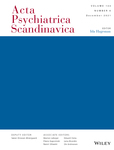Association between exposure to atypical antipsychotics during pregnancy and risk of miscarriage
Abstract
Objective
To evaluate the association between exposure to atypical antipsychotics during pregnancy and risk of miscarriage.
Material and Methods
This nested case–control study used a large Japanese administrative database. Pregnancy onset and outcomes were estimated using previously reported algorithms, classifying cases as women becoming pregnant between 2013 and 2022 and ending in a miscarriage. Controls were randomly selected from the entire pregnancy cohort by risk-set sampling with replacement and were individually matched to the cases (3:1). The association between exposure to atypical antipsychotics and risk of miscarriage was assessed using conditional logistic regression adjusted for confounders. The association between benzodiazepine exposure and the risk of miscarriage was assessed as a positive control.
Results
In the cohort, 44,118 patients were matched with 132,317 controls. The mean ages (standard deviations) of the case and control groups were 33.3 (5.7) and 33.2 (5.5) years, respectively. The prevalence of atypical antipsychotics was 0.5% in both groups. Aripiprazole is an individual antipsychotic with the highest prescription prevalence. The adjusted odds ratios (aOR) for miscarriage were 0.966 (95% confidence interval [CI], 0.796–1.173) for atypical antipsychotics and 0.998 (0.784–1.269) for aripiprazole. A higher aOR (1.431, 95% CI 1.303–1.573) suggested an association with benzodiazepines. A sensitivity analysis that limited the population to women diagnosed with schizophrenia alone did not suggest an association between atypical antipsychotics and the risk of miscarriage.
Conclusions
The results of this study do not suggest an association between exposure to atypical antipsychotics during pregnancy and the risk of miscarriage.

 求助内容:
求助内容: 应助结果提醒方式:
应助结果提醒方式:


